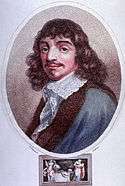Cartesianism
Cartesianism is the name given to the philosophical and scientific system of René Descartes and its subsequent development by other seventeenth century thinkers, most notably Nicolas Malebranche and Baruch Spinoza.[1] Descartes is often regarded as the first thinker to emphasize the use of reason to develop the natural sciences.[2] For him, the philosophy was a thinking system that embodied all knowledge, and expressed it in this way:[3]
Cartesians view the mind as being wholly separate from the corporeal body. Sensation and the perception of reality are thought to be the source of untruth and illusions, with the only reliable truths to be had in the existence of a metaphysical mind. Such a mind can perhaps interact with a physical body, but it does not exist in the body, nor even in the same physical plane as the body. The question of how mind and body interact would be a persistent difficulty for Descartes and his followers, with different Cartesians providing different answers.[4]
Ontology
Descartes held that all existence consists in three distinct substances, each with its own essence:[4]
- matter, possessing extension in three dimensions
- mind, possessing self-conscious thought
- God, possessing necessary existence
Epistemology
Descartes brought the question of how reliable knowledge may be obtained (epistemology) to the fore of philosophical enquiry. Many consider this to be Descartes' most lasting influence on the history of philosophy.[5]
Cartesianism is a form of rationalism because it holds that scientific knowledge can be derived a priori from 'innate ideas' through deductive reasoning. Thus Cartesianism is opposed to both Aristotelianism and empiricism, with their emphasis on sensory experience as the source of all knowledge of the world.[4]
For Descartes, the faculty of deductive reason is supplied by God and may therefore be trusted because God would not deceive us.[4][6][7]
Geographical dispersal
In The Netherlands, where Descartes had lived for a long time, Cartesianism was a doctrine popular mainly among university professors and lecturers. In Germany the influence of this doctrine was not relevant and followers of Cartesianism in the German-speaking border regions between these countries (e.g., the iatromathematician Yvo Gaukes from East Frisia) frequently chose to publish their works in The Netherlands. In France, it was very popular, and gained influence also among Jansenists such as Antoine Arnauld, though there also, as in Italy, it became opposed by the Church. In Italy, the doctrine failed to make inroads, probably since Descartes' works were placed on the Index Librorum Prohibitorum in 1663.[8]
In England, because of religious and other reasons, Cartesianism was not widely accepted.[8] Though Henry More was initially attracted to the doctrine, his own changing attitudes toward Descartes mirrored those of the country: "quick acceptance, serious examination with accumulating ambivalence, final rejection."[9]
Notable Cartesians
- Antoine Arnauld[8]
- Balthasar Bekker[8]
- Tommaso Campailla[10]
- Johannes Clauberg[8]
- Michelangelo Fardella[8]
- Antoine Le Grand[8]
- Adriaan Hereboord[8]
- Nicolas Malebranche
- François Poullain de la Barre
- Edmond Pourchot
- Pierre-Sylvain Régis[8]
- Henricus Regius[8]
- Jacques Rohault[8]
- Christopher Wittich[8]
See also
References
- ↑
 Chisholm, Hugh, ed. (1911). "Cartesianism". Encyclopædia Britannica (11th ed.). Cambridge University Press.
Chisholm, Hugh, ed. (1911). "Cartesianism". Encyclopædia Britannica (11th ed.). Cambridge University Press. - ↑ Grosholz, Emily (1991). Cartesian method and the problem of reduction. Oxford University Press. ISBN 0-19-824250-6.
But contemporary debate has tended to...understand [Cartesian method] merely as the 'method of doubt'...I want to define Descartes's method in broader terms...to trace its impact on the domains of mathematics and physics as well as metaphysics.
- ↑ Descartes, René; Translator John Veitch. "Letter of the Author to the French Translator of the Principles of Philosophy serving for a preface". Retrieved August 2013. Check date values in:
|access-date=(help) - 1 2 3 4 "Cartesianism | philosophy". Encyclopedia Britannica. Retrieved 2016-01-27.
- ↑ Ree, Jonathan (1991). The Concise Encyclopedia of Western Philosophy and Philosophers. London: Routledge. p. 78. ISBN 0415078830.
- ↑ Ree, Jonathan (1991). The Concise Encyclopedia of Western Philosophy and Philosophers. London: Routledge. p. 75. ISBN 0415078830.
- ↑ Kelly, Anthony (2006). The Rise of Modern Philosophy. Oxford: Oxford University Press. p. 123. ISBN 9780198752769.
- 1 2 3 4 5 6 7 8 9 10 11 12 Copleston, Frederick Charles (2003). A History of Philosophy, Volume 4. Continuum International. p. 174. ISBN 978-0-8264-6898-7.
- ↑ Lennon, Thomas M.; John M. Nicholas; John Whitney Davis (1982). Problems of Cartesianism. McGill-Queen's Press. p. 4. ISBN 978-0-7735-1000-5.
- ↑ Cristofolini, Paul; "Campailla, Thomas" in Biographical Dictionary of Italians - Volume 17 (1974), Istituto della Enciclopedia Italiana. Retrieved 30 September 2015
Bibliography
| Wikisource has the text of the 1911 Encyclopædia Britannica article Cartesianism. |
- Francisque Bouillier, Histoire de la philosophie cartésienne (2 volumes) Paris: Durand 1854 (reprint: BiblioBazaar 2010).
- Eduard Jan Dijksterhuis, Descartes et le cartésianisme hollandais. Études et documents Paris: PUF 1951.
- Tad M. Schmaltz (ed.), Receptions of Descartes. Cartesianism and Anti-Cartesianism in Early Modern Europe New York: Routledge 2005.
- Richard A. Watson, The Downfall of Cartesianism 1673–1712. A Study of Epistemological Issues in Late 17th Century Cartesianism The Hague: Martinus Nijhoff 1966.
